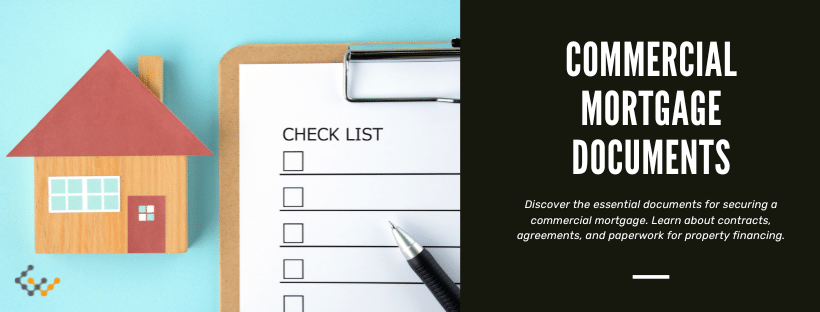Commercial Mortgage Documents: What Do Lenders Look For?

Applying for a commercial real estate loan is a multi-step process that requires a number of documents. Here’s what lenders generally need to see when approving and underwriting a loan for investment property.
What Commercial Real Estate Loan Documents Do You Need?
While lenders generally ask for a fairly standard set of information, the exact documents required can vary based on the lender, type of property, and loan type. You should be prepared to furnish the following commercial real estate loan documents for most loan applications.
Answer a few questions and get custom mortgage quotes. We'll match you with offers from our network of 650+ lenders.
Commercial Mortgage Documents: The Basics
These are basic documents that lenders will certainly ask for. They’re also the first documents you’re likely to submit:
- Loan Application: Officially starts your loan application. Usually covers basic personal information, business information, preliminary financial information, and some property information.
- Purchase Sale Agreement (PSA): A copy of the purchase agreement that’s signed by both the buyer and seller. Usually furnished by the listing broker.
- Offering Memorandum (OM): A packet detailing the property, typically including listing price, key metrics and pictures. Again, it is usually furnished by the listing broker.
- Resume: A standard resume focusing on the business’ and investors’ experience with real estate. Has varying levels of importance.
- Appraisal: A standard appraisal is almost always ordered. While the lender usually takes care of getting an appraisal, they’ll include the fee in the loan’s costs.
Download our loan checklist
Choose the one that best suits your needs
Commercial Loan Documents: Financials
Financials, of course, form the foundation of any commercial real estate loan underwriting process. You’ll have to provide extensive details on personal and business financials:
- Personal Financial Statement (PFS): Outlines your personal assets and liabilities, which are used to calculate net worth and assess liquidity. Should be current.
- Business Tax Returns (BTS): Copy of your business’s federal tax return for the last 2-3 years. Your personal returns are likely to be required if you don’t have 2-3 years of returns for the business, or if you’re personally guaranteeing the loan.
- Historic Profit & Loss Statements (P&Ls): Standard P&Ls that show revenues, expenses and net operating income for the last 2-3 years. Should be formatted for annual reporting.
- Current Profit & Loss Statement: P&L statement showing revenues, expenses and operating income for the current year (YTD).
- Credit Scores: Your business’s credit score will be pulled. Your personal credit score will also be pulled if you’re personally guaranteeing the loan, or if the business doesn’t have an established credit history.
Commercial Loan Documents: Refinancing
Refinancing requires most of the aforementioned documents, along with a couple of other items. You’ll also need to furnish:
- Current Mortgage Statement(s): Details on all outstanding loans, and any other liens, against the property being refinanced.
- Rent Roll: Shows the current tenants, what space within the property they occupy, and pertinent lease details.
Additional Required Commercial Mortgage Documents
The above are commonly required documents, but lenders will need additional documents in certain cases. For example, lenders might want:
- Environmental Reports: An environmental report might be required to ensure the land and/or building aren’t contaminated. This is common if a previous business could’ve contaminated the site, such as a gas station that could’ve had its tanks leak.
- Special Loan Application: Certain loan programs might have additional application sections. For example, a loan program for adding energy efficiency features might require an energy assessment and proposed plan. A low-income housing loan could require details about local housing options, affirmation of the intended use, and other items.
Documents Needed to Apply for a SBA Loan
The Small Business Administration (SBA) offers a variety of loan options, each of which has its own requirements. All of the SBA’s programs normally require the following, though:
- SBA Loan Application: A specialized loan application that’s longer than some standard applications. It usually has more particular details on the loan and business.
- Business Plan: A proposed business plan, covering strategy, financial projections and other information. The SBA often considers viability and purpose when underwriting loans.
- Debt Schedule: Complete financial details on any and all existing debts that the business has.
Why Do Commercial Lenders Need These Documents For?
Commercial loans inherently come with more risk than residential loans.
The purpose of these various commercial mortgage real estate loan requirements is to provide lenders with a clear understanding of the borrower’s financial standing, ability to repay, and the property’s potential value and risk factors. By evaluating this data, lenders can make informed decisions and mitigate potential losses.
The borrower is, of course, the business. It’s also the business owner/investor to some degree.
Where to Get These Commercial Loan Documents?
Many of the personal and business financial documents will come from your own records, accountant, real estate agent and/or attorney.
Property-specific documents, like appraisals or environmental reports, are completed by specialized third-party professionals. Your commercial real estate broker or the lender should be able to provide referrals or guidance on obtaining these.
Importance of Accurate Loan Application Documents
All documents submitted to a lender must be accurate. Providing incorrect or misleading information can lead to delays, added scrutiny, or even denial of the loan application. Clear cases of fraud can have other legal consequences as well.
5 Ways to Improve Your Chances of Getting Approved for a CRE Loan
So, how to get approved for commercial real estate loans?
- Enhance Your Credit Score: A higher credit score reassures lenders of your creditworthiness. Focus on building your personal credit score if your business is new.
- Lower Your Debt Burden: A lower debt-to-income (DTI) ratio often leads to better loan terms and easier approval. This is most true of the business, but your personal DTI can come into play, too.
- Prepare a Robust Business Plan: When a loan application is borderline, a strong business plan can help sway lenders toward approval. Make the plan complete, clear and well-presented.
- Choose Properties Wisely: Lenders consider the risk of an investment property failing. Choose properties with strong cash flows, in good condition and in growing areas if you’re struggling to get approved.
- Work with Experienced Brokers: An experienced broker will be able to guide you through the application process, and is more apt to know how to address certain issues that could arise with your application.
Wrapping Up
Securing a commercial real estate loan can be challenging for newer real estate investors, but being well-prepared with the right documentation is half the battle. Once you understand what lenders look for, you can build a solid application that’ll give you the best chance possible of being approved.





